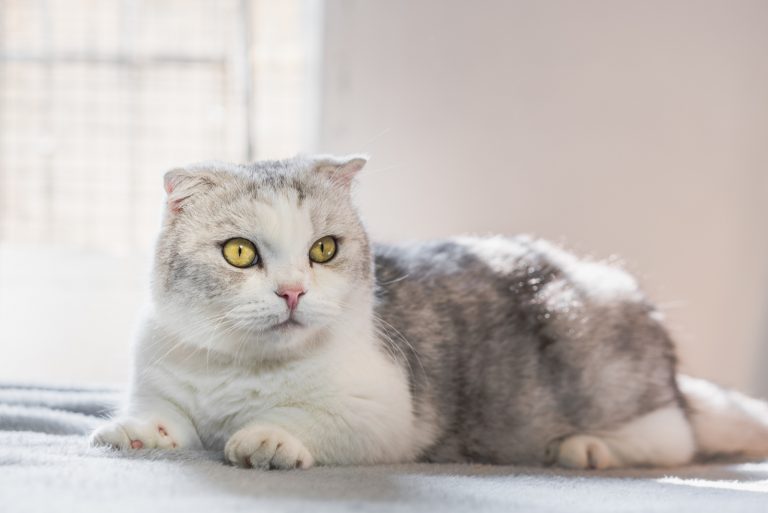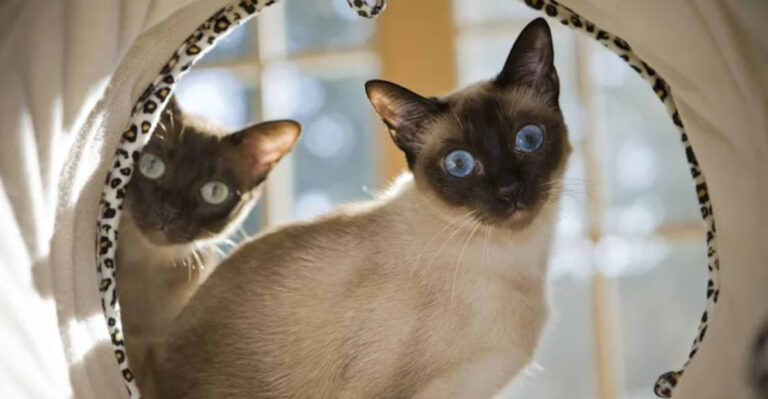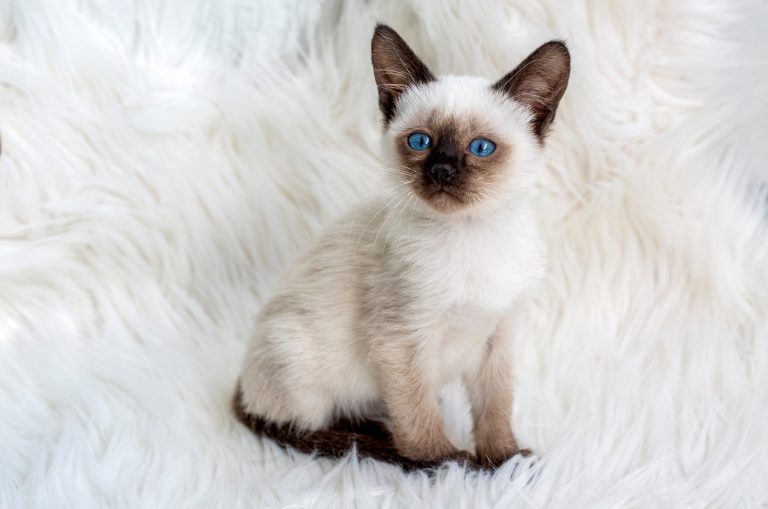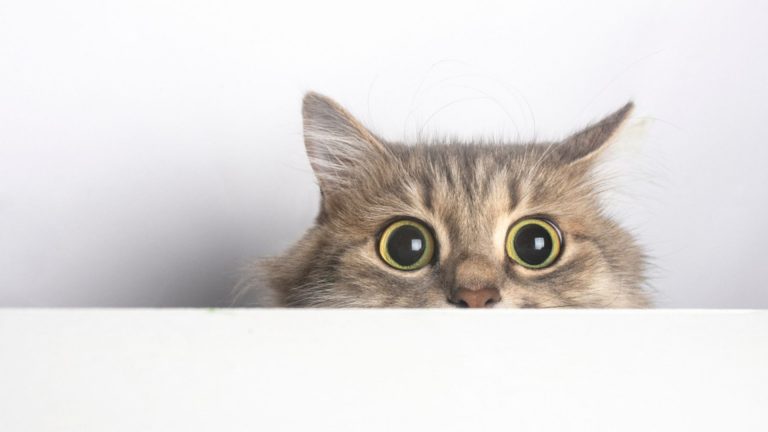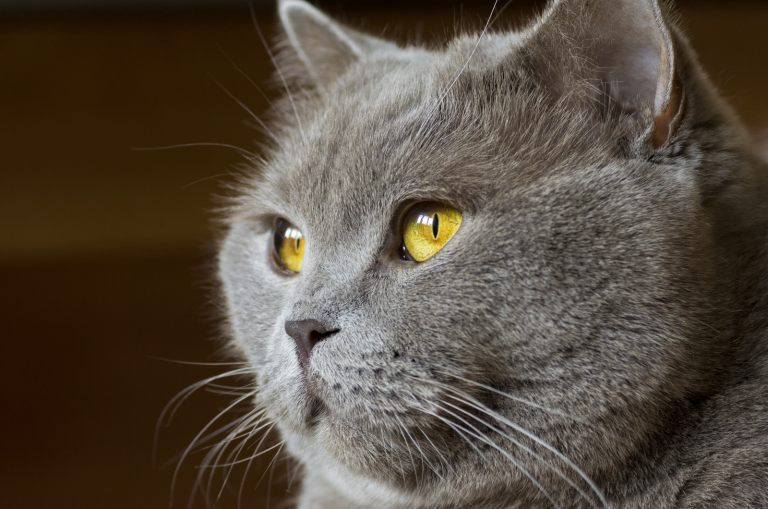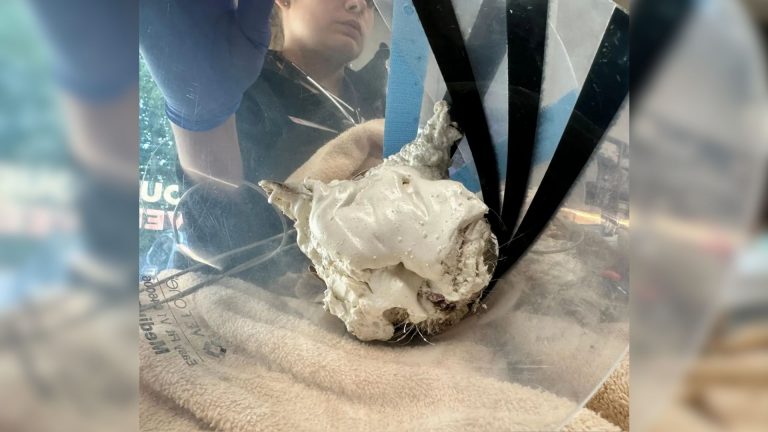Cat Not Eating Much But Acting Normal: 7 Reasons Why
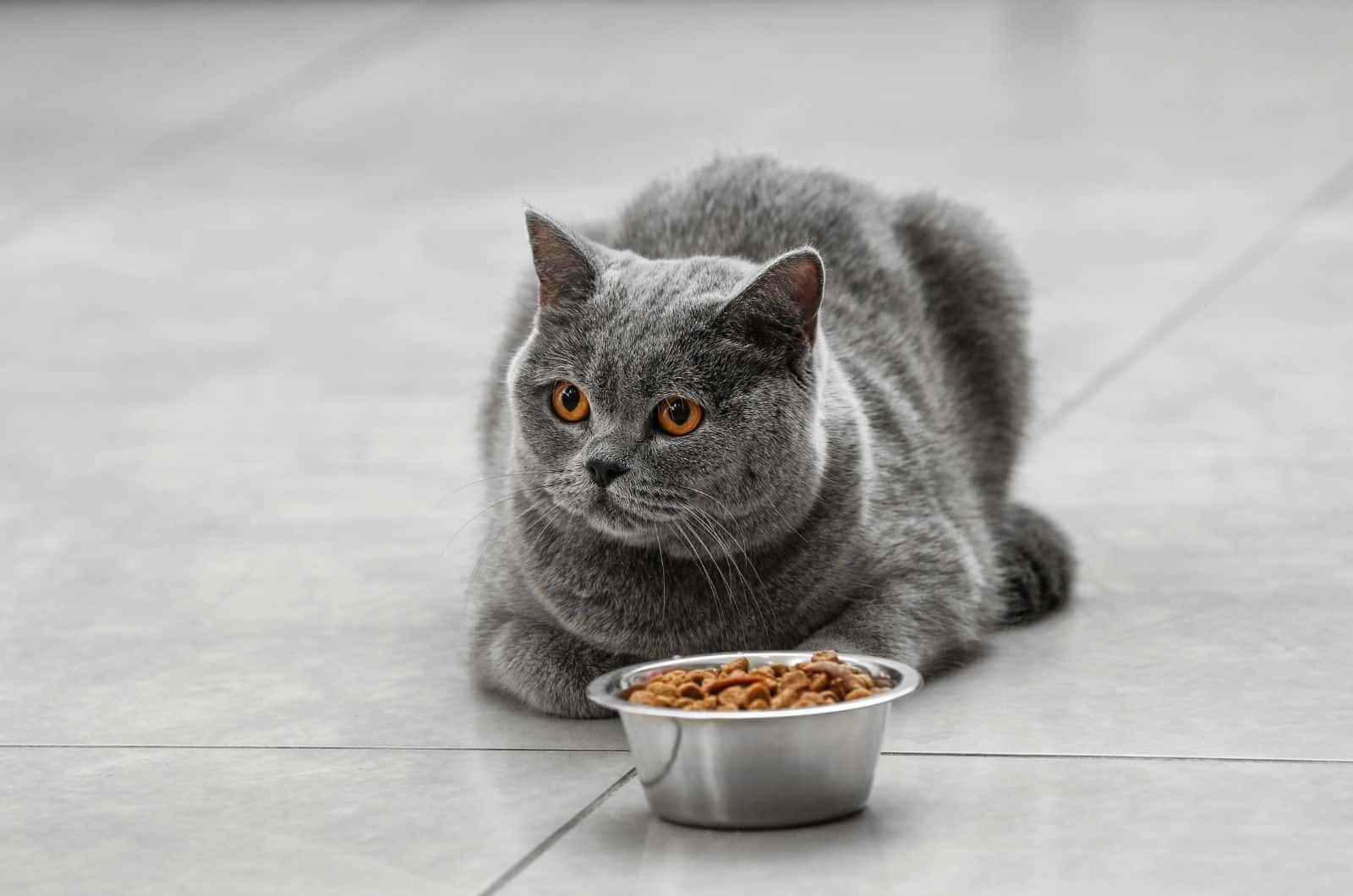
Our pets become family members pretty quickly and, as with any other family member, you notice if they’re not behaving how they usually behave. If you notice your cat is eating less than usual, but not displaying any other unusual behaviors, you will probably be confused and concerned.
Naturally, you will wonder Why is my cat not eating much but acting normal?
Potential reasons for your cat eating less than usual can be very simple such as your cat simply disliking the food you’ve been giving them, or experiencing stress, or anxiety. The cause can be more concerning; perhaps your cat is feeling nauseous. Your cat’s age can be a reason for appetite change too. Of course, you will worry that there may be an underlying health issue causing your cat to eat less.
Most potential reasons for a kitty’s slight loss of appetite are nothing to worry about, but there is a chance that your cat is dealing with some health issue that needs veterinary care.
Continue reading to learn all about what might be causing your cat to not eat much but still act normal, what you can do to help your cat regain its appetite, and when you should worry about your kitty not eating much!
7 Reasons Behind A Cat Not Eating Much But Acting Normal
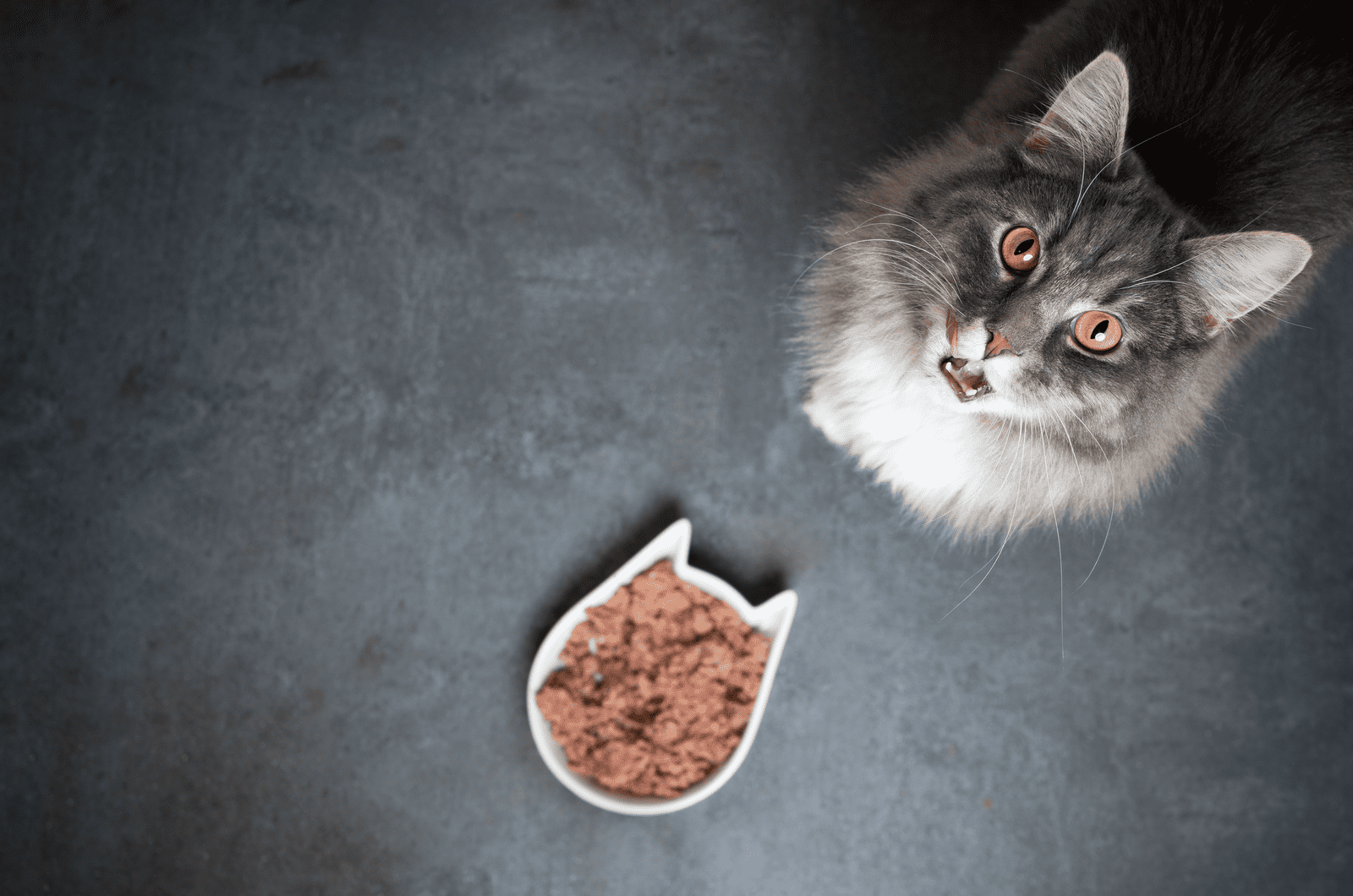
Without further ado, the most probable reasons your cat is eating less than usual are:
• The food is the issue
• Your kitty is experiencing stress or anxiety
• It’s simply due to your cat’s age
• Your cat might be temporarily nauseous
• It might be an early sign of a dental problem
• It’s a symptom of an underlying health issues
• Recent vaccination might be the cause
Below, I’ve thoroughly explained each of these major reasons your cat is not eating as much, so make sure to continue reading to learn all about the potential causes of your cat’s loss of appetite!
1. The Food Is The Issue
We all know that cats can be picky eaters. They will not eat everything you give them and even slight changes in the taste or the type of their food can make your cat reject their meal.
The most simple reason for your kitty not eating as much as they usually do is that your cat does not like the food you’ve been giving them!
So, why would a cat not like their food all of a sudden? The potential reasons are:
• You’ve switched to a new type of food (for example, from dry food to wet food all of a sudden).
• You’ve switched to a new cat food brand (and obviously, your cat does not like the taste).
• Your kitty is simply bored of the same old food every day.
• Your cat feels there is something wrong with the food (the food might be starting to spoil, for example)
If your cat simply does not like their food, it’s possible they will not be eating as much as usual. If their only problem is not liking the taste of their meals, they will be acting completely normal in other ways since they don’t have any other underlying issues.
Lucky for your cat (and you), this issue is an easy fix!
Suggested Read: Why My Cat Wont Eat Wet Food? All There Is To Know!
2. Your Kitty Is Experiencing Stress Or Anxiety
As you probably already know, cats are sensitive animals and some cats are more sensitive than others. Some cats frequently become stressed or irritated by events taking place around them, or by the way people treat them.
Your cat may become emotionally distressed or physically ill, as well as exhibiting problematic behavior when they’re under a lot of stress or experiencing frequent anxiety.
So, you must be wondering – what causes stress or anxiety in cats?
There are many potential triggers, but the most prominent ones are:
• Switching homes
• Having a new addition to the family – a new pet or even a baby
• Having a lot of people in the house
• Construction work in or around the house (cats don’t like loud noises or bright lights)
• Being petted too much (some cats become overstimulated easily)
• Changing the location of their food bowl water bowl, or litter box
A cat experiencing stress or anxiety might display the following symptoms as well as not eating normally:
• Being lethargic
• Having diarrhea or vomiting
• Overgrooming
• Poor coat appearance
• Displaying problematic behavior, such as peeing over the edge of the litter box
Even if your cat is not displaying any other signs of stress at the current time, it doesn’t mean it will not start displaying them in a few days.
That’s why it’s good to be aware of the signs your kitty might be stressed and pay extra attention whether your feline friend is displaying them or not.
3. It’s Simply Due To Your Cat’s Age
Is your cat reaching the senior cat stage? If the answer is yes , then a potential reason your kitty is not eating much is simply because they’re aging.
A beloved cat aging might not be something that pet owners notice happening until one day they suddenly see a lot of signs that their cat is, indeed, a senior cat now.
Older cats have significantly slower metabolism than younger cats – they simply don’t need the energy that they once did! This means that senior cats don’t eat as much as younger cats.
The same goes for humans – a 70 year old man will most probably eat less than a 30 year old man, who is at his peak strength and needs a lot of energy to get through the day!
Apart from eating less, senior cats also:
• Are not as energetic
• Hunt less
• Sleep more
• Spend less time outdoors
• Are not so eager to play
• Start depending on their owners more and more
These signs of aging are completely normal, so there is no need to be worried if your senior cat does not eat the same amount of food as before!
4. Your Cat Might Be Temporarily Nauseous
The most common sign your cat is nauseous is a loss of appetite. This is completely understandable – when you’re nauseous, you don;t want to eat much, right?! The same goes for cats.
So, what might be causing your cat to feel nauseated? This can be due to:
• Your cat experiencing motion sickness
• A reaction to medication
• Seasonal allergies
• Hairballs
• Licking flea treatment
Your cat’s nausea can manifest in a slight change in appetite, but it can also manifest as drooling, vomiting, and a general feeling of weakness, so be on the look-out for these signs too.
5. It Might Be An Early Sign Of Dental Problem(s)
As you already know, a cat’s dental health is extremely important for their overall well-being and quality of life. Dental issues are actually quite common in cats, proven by the fact that most cats older than 3 experience some type of issue regarding their gums, teeth or oral cavity in general.
If your kitty is experiencing any type of painful dental disease, there is a good chance they might not be eating much, in order to avoid experiencing the pain or discomfort that comes from chewing.
Dental issues a cat can develop include:
• Periodontal disease (feline periodontitis)
• Stomatitis
• Gingivitis
• Broken teeth
• Trauma to the mouth
• Infection of the oral cavity
• Feline odontoclastic resorptive lesions (tooth resorption)
• Oral cancer
Luckily, most dental problems can be treated, but of course, preventing the problem from arising in the first place is always better than treating the problem after it arises! It pays to make sure your cat’s teeth and gums are healthy!
6. It’s A Symptom Of Other Underlying Health Issues
Unfortunately, cats are not immune to disease, and most cats have to deal with some sort of health issue at some point (just like people really!). Older cats are more prone to developing serious health issues, but younger cats can also become ill.
A common symptom of many medical issues that a cat might experience is loss of appetite, resulting in a cat not eating as much. On the other hand, cats are masters of hiding pain, so a cat might seem “normal” in other ways.
The list of potential health issues that cause a reduced appetite as one of their first symptoms is long and diverse.
Medical problems your cat might be battling include:
• Kidney disease
• Diseases of the digestive system
• Pancreatitis
• Liver disease (such as hepatic lipidosis)
• Urinary tract disease
• Respiratory disease
• Psychological issues
• Cancer
Even if a cat is not displaying any other symptoms aside from appetite loss, it may be that the symptoms have not developed (yet), or that the cat is hiding them very effectively.
7. Recent Vaccination Might Be The Cause
When it comes to the long-term health of your cat, vaccination should be at the top of your to-do list! Vaccines protect animals from potentially deadly infections, so it is essential that you follow your vets vaccination advice..
Temporary loss of appetite is a very common vaccination side-effect.
So if your little furry friend has recently been vaccinated, the most probable cause of them not eating much is their body’s reaction to the vaccine!
Apart from loss of appetite, your cat might also experience:
• Redness at the side of vaccine administration
• Fever
• Fatigue
• Sneezing and coughing
• Other more serious symptoms
Vaccines can cause a number of side effects, like the majority of medications. However, the positive impacts do outweigh any potential negative effects by a wide margin. This cause of appetite change will be temporary.
7 Things You Can Do To Help Your Cat
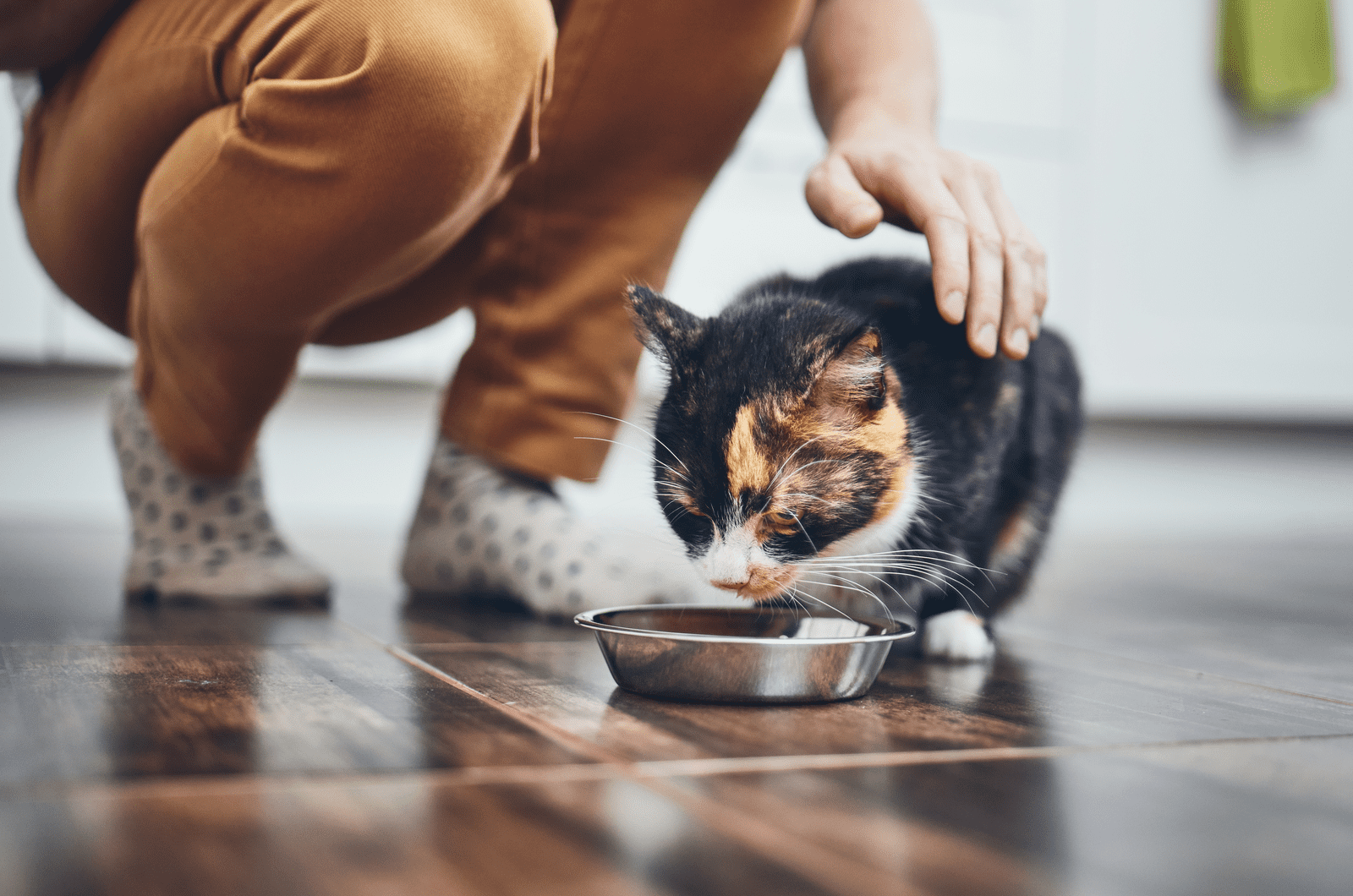
It’s natural for you to worry if your kitty is not eating as much as you’d expect them to. We all want the best for your pets, and their health is the top priority.
Reduced appetite might be a potential cause for concern, so it’s important you get your furry friend’s appetite back to normal, so they can get their intake of nutritious food back on track!
The most important thing is to figure out what’s causing your cat’s reduced appetite. Once you find the cause, you can find the best way to help your cat regain its appetite!
Let’s take a look at what you can do to help a cat that’s not eating as much as usual, but which is also not displaying any other symptoms you might worry about.
1. Try Changing The Food
If you suspect your kitty dislikes the food you are giving it, and therefore is not eating as much as usual, you’re lucky, because that’s an easy problem to solve!
If you’ve tried a new type of cat food…
For example, if you’ve decided to switch from dry cat food to wet cat food for whatever reason, and you observe that your cat is eating less than before, it may be that your cat simply does not like wet food. If your cat is used to eating kibbles and has been doing so for quite some time, it’s possible they will be less keen on wet food.
The same goes for switching from wet to dry cat food. The change from one type of cat food to another should not be sudden – start slowly introducing it into your cat’s diet!
If you’ve tried cat food from another brand…
On the other hand, perhaps you’ve just tried out some new food of a different brand and your cat simply does not like it. I personally had a cat like that – she only liked food from a particular cat food brand so the solution was to always buy them food from that particular brand and I didn’t have any further issues.
If you’ve switched to a more homemade diet…
If you’ve started, for example, incorporating more homemade food in your cat’s diet and you’ve observed your kitty eating less, then I’m sorry to say that your cat probably does not like it as much as they like the store-bought cat food.
The solution is simple!
Stick to what you know your cat likes! Of course, trying out new food is fine, but if you observe your cat eating less after switching to a new type of food – it’s a clear sign you need to return to the previous diet or introduce the new food more gradually..
Suggested Read: The Best Cat Food For Persian Cat: Yummy Guide
2. Try Appetite Stimulants
An appetite stimulant is a substance that increases your cat’s desire for eating, hopefully resulting in your cat’s appetite returning to normal. They can come in the form of your cat’s favorite food or snack, tablets, gels, lickable treats, liquids, and syrups.
Appetite stimulants can be both prescribed by a vet or store-bought. If your cat is simply not eating as much and has not completely stopped eating, then you should try the store-bought options first. Those should be pretty easy to find – it’s anything containing catnip or simply your cat’s favorite food and treats!
Canned food is recommended to be given to cats with reduced appetite, as its smell is more intense and this can encourage the cat to eat more.
On the other hand, if you observe any weight loss, it’s time to visit the vet who will investigate and potentially prescribe appetite stimulants.
3. Create A Stress-Free Environment For Your Kitty
Stress and anxiety are a potential cause of your cat’s reduced appetite. On the other hand, if your cat is not experiencing any kind of stress and is perfectly happy, their appetite should be back to normal in no time!
If you’ve concluded that your cat is eating less because they’ve been under stress lately, then the obvious solution is to remove the source of the stress.
Finding out what is triggering your cat’s stress might not be a simple task, but remember the most common causes of stress mentioned above:
• Moving homes
• A new addition to the family – a new pet or baby
• Guests in the house
• Construction work causing noise and disruption
• Too much petting
• Changing the location of their food bowl, water bowl, or litter box
If any of these stress triggers fit your cat’s situation, you can work to remove the trigger. . If not, continue seeking other causes of stress that may be impacting your cat.
After you’ve successfully found the cause of stress, I’m sure you’ll know what to do in order to remove it from your cat’s environment. Solutions are there for every possible cause of stress, it just takes a few good ideas, time, and patience!
If the cause of stress is a recent move, then you need to give your cat some time and make sure they’re comfortable. If the cause of stress is loud noises from construction work, try giving your cat to a friend for a day or two until the work is finished. Most causes of stress will ease in time or with some gentle adjustments.
Also Read: How Long Does It Take A Cat To Adjust To New Home? Explained
4. Monitor Your Cat’s Eating And Drinking Habits
This will not necessarily make your cat’s appetite great again, but it is nevertheless very important that you track how much your cat is eating and drinking!
There is no need for me to talk about the importance of your cat eating enough food or drinking water throughout the day. The recommended amount of food and water depends on your cat’s weight and the amount of physical activity it does. It is to be expected that an indoor cat will need less food and water than an explorative outdoor cat.
It’s important that you monitor how much and how often your cat is eating, especially if you notice your cat hasn’t been eating as much lately.
If your cat’s reduced appetite is not improving or they’ve started eating less and less – then this is an issue that needs your attention. For you to notice if this is happening, you need to pay close attention to your cat’s daily food intake.
If you notice your cat is slowly gaining its appetite back, that’s great news for your cat (and it means you don’t have to worry anymore!).
5. Try Free Feeding Or Having Fixed Meal Times
If you have observed that your cat is not eating much lately, you can try switching to a different feeding routine. Your cat might be bored of the same old routine so changing their meal routine might be a good idea.
If your cat has been on a free feeding routine, try introducing fixed meal times, and vice versa.
Having fixed meal times could increase appetite and anticipation in a cat that has been on a free feed routine for a long time. On the other hand, a free feeding cat which has been introduced to a fixed meal time routine could start eating more because they can feed any time they decide they want to!
The most important thing is not to pressure your cat to get into a new routine too quickly! Cats are known to be creatures of habit, and they don’t accept rapid changes easily. Take it easy – if you suspect your cat doesn’t like the new feeding routine, don’t force it!
Also Read: Top 5 Choices Of Homemade Cat Food To Gain Weight
6. Determine If Your Cat Needs To Visit A Vet
A cat not eating much but acting normal in other ways is usually not something that needs veterinary care, but the most important word here is usually; there is a slight chance that your cat’s decreased appetite is a cause for concern.
You should take your cat for a quick trip to the vet if:
• You notice your cat is losing weight
• You notice your cat is displaying any other symptoms of a health issue
• You notice your cat’s appetite is not increasing after a significant amount of time
It is possible that your cat’s reduced appetite is the first sign that they’re dealing with a health issue. Lack of appetite is actually a pretty common symptom that displays in almost all health problems that your cat might encounter.
Make sure to keep a close eye on your cat’s health and if you notice other symptoms (such as vomiting, drooling, weight loss or anything else unusual) I highly suggest a visit to the vet’s office!
7. Simply Wait It Out (But Be Careful)
This might seem like a silly idea, but a possible solution can be to do nothing and see if your cat’s reduced appetite goes away on its own. Let’s be real – vet visits are not free, and not every minor health issue needs veterinary care.
Cat owners, if you observe no other changes in your cat’s behavior or physical appearance and your cat’s reduced appetite is not deteriorating into a complete refusal to eat, you can just wait it out for a few days or a week.
It may simply be that your cat is in a weird mood or it’s too hot in the house so they don’t feel like eating much. There are other random reasons why a cat might not be feeling that hungry for the time being, and they are mostly harmless!
Of course, if you see your cat exhibiting other symptoms that something might be wrong – you cannot simply wait it out!
If your cat starts looking underweight and stops eating, you cannot simply do nothing. Waiting it out is only an option if your cat is looking and behaving normally and is not losing weight or displaying any other symptoms of a potential health issue.
When Should You Worry? 4 Signs To Look For
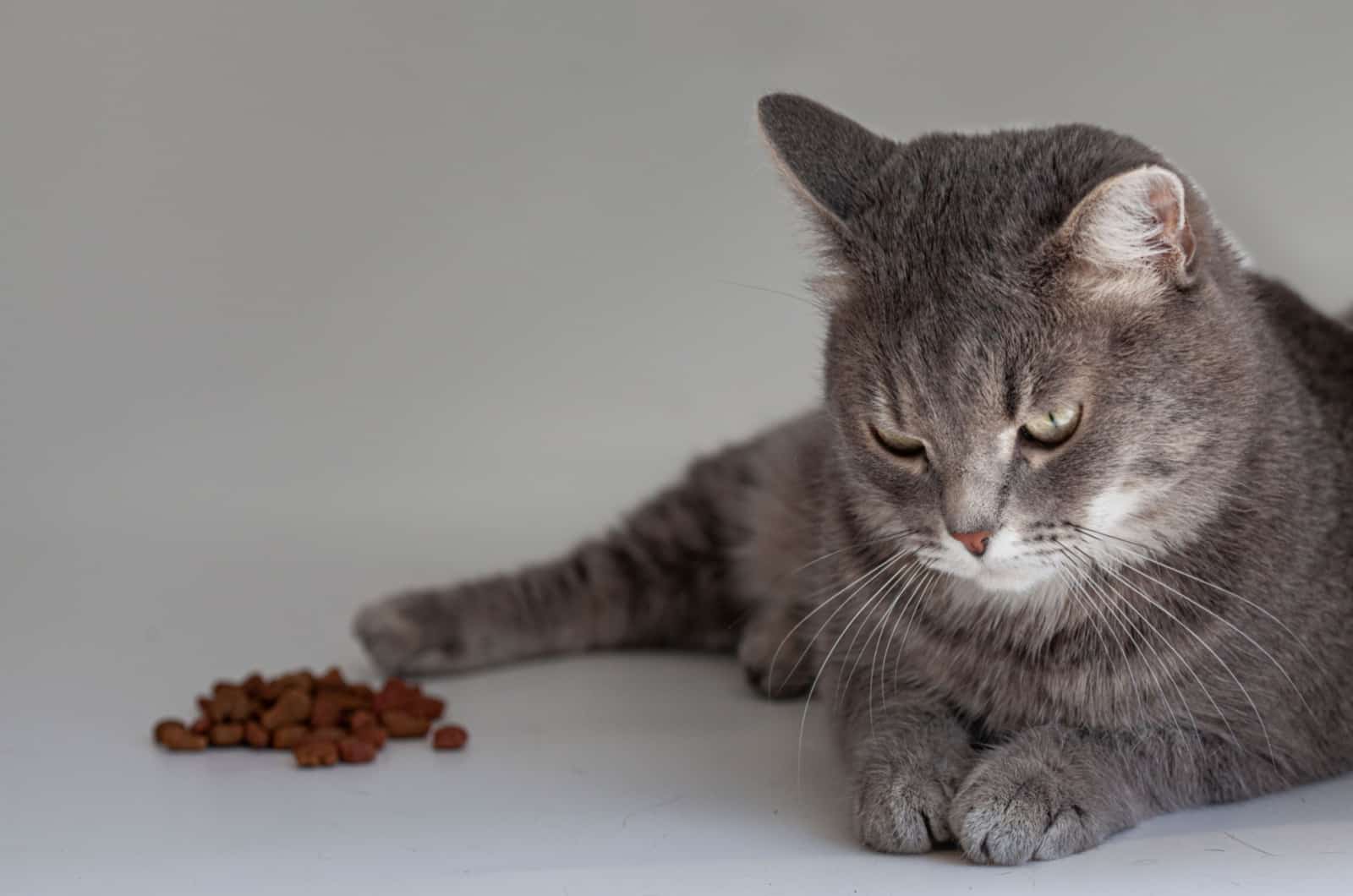
A cat not eating much but still acting normal is usually not something to be overly concerned about. If your cat is acting and looking the same as usual, displaying no other symptoms of a potential disease, then you just need to monitor its condition.
Hopefully, a kitty’s reduced appetite will only be present for a short period of time and will resolve on its own or with your help. Of course, this is not always the case.
As I mentioned previously in this article, lack of appetite can be the first symptom of disease. If this is the case, you need to pay close attention to the following signs that your cat is having some health issues.
1. If Your Cat Is Not Regaining Their Appetite
Every living being needs energy to fuel their body. Of course, energy is obtained via food. If there is not enough food, there is not enough energy for the body to do all the work of “keeping the engine running”.
A cat’s appetite is extremely important in keeping the cat alive and healthy.
If a cat has a reduced appetite for a long period of time, that can lead to losing weight, issues with the immune system and a lack of nutrients, which is definitely not healthy.
If your cat is not regaining their appetite after some time, this is not normal and needs to be investigated more closely in order to find the cause.
Finding out what’s causing your cat’s loss of appetite should be your priority, and then trying to solve the issue to help your kitty get their appetite back as soon as possible.
If you can’t seem to find the cause or help your cat regain their appetite back, I highly suggest going to the vet’s office for further investigations.
2. If Your Cat Is Visibly Losing Weight
If a cat is not eating enough for some time, this will naturally lead to weight loss. Many pet owners worry about their feline friends gaining weight and being overweight, but a cat losing weight and becoming underweight is just as dangerous!
Weight loss in your cat could be a symptom of a more serious health issue.
Weight loss is one of the most common symptoms that a cat with medical problems is dealing with. The vast majority of cat diseases have weight loss as one of their main symptoms, so it is important you devote your time to solving this issue with professional help.
The best thing you can do is visit the vet. This is the most effective way to identify the root cause of your cat’s weight loss and create the most effective treatment strategy. Considering that significant weight loss is a symptom of many potential health issues, it’s best not to try any home remedies or weight-gain foods, but rather go straight to the vet.
3. If Your Cat Has Completely Stopped Eating
Sometimes, your cat’s decreased appetite can lead to complete loss of appetite. If your cat stops eating completely, that is a tale-tell sign that something is seriously wrong. A cat is not likely to skip meals for a couple of days just because they don’t like the food or because they’re in a bad mood.
You should act immediately if your cat isn’t eating, has missed multiple meals, or has gone several days without food.
The medical condition behind this total loss of appetite can range from mild to more serious, including such conditions as:
• Dental issues
• Kidney issues
• Respiratory issues
• Urinary tract issues
• Gastrointestinal issues
• Psychological issues
Weight loss is caused by a primary health issue, but the loss of weight can itself lead to secondary issues, which can compound the problem. This issue really needs the attention of a doctor of veterinary medicine (DVM).
Suggested Read: How Long Can A Cat Go Without Food? What You Need To Know
4. If Other Signs Of Health Issues Appear
A cat’s reduced appetite can be just the first sign of a potential health issue your kitty is battling with. It might soon be followed by other symptoms, which may be subtle or more obvious.
It’s important to be on the lookout for any changes in your cat’s behavior or appearance, so you can quickly spot other potential signs of an underlying health issue your pet might have.
Recognizing the signs of a disease or infection early is crucial! If symptoms are observed and treated quickly, it can stop the health issue from developing into a more serious form.
If you notice your cat having a runny nose, coughing, being weak or lethargic and sleeping all day, these are signs that your kitty is sick.
FAQ
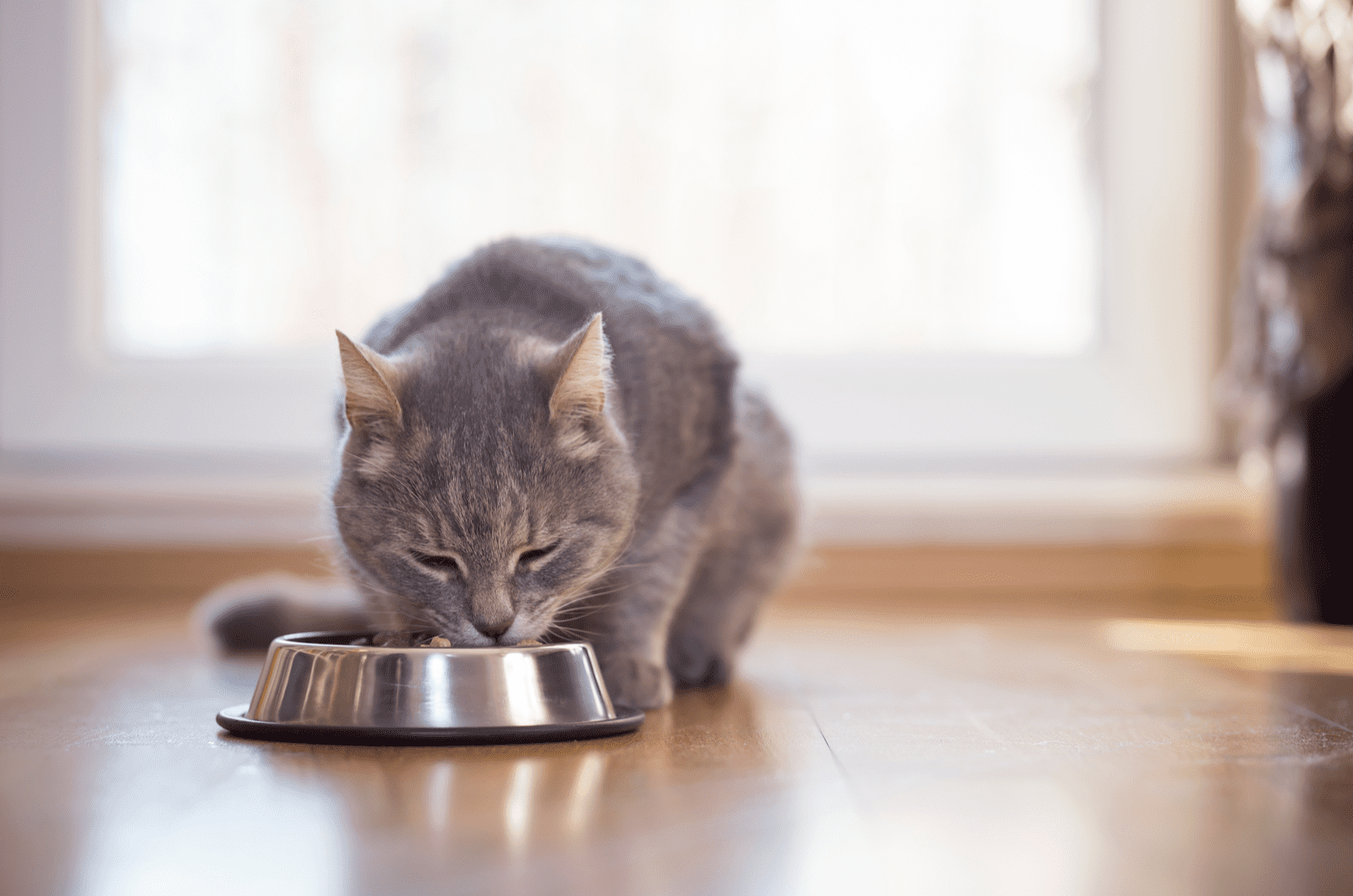
1. Why Is My Cat Only Eating A Little Bit?
Your cat not liking the food, being under stress or feeling nauseous or experiencing vaccine side-effects could be potentially causing your cat to eat less than usual, or your cat may simply be older and doesn’t need as much food as they once did.
It may also be that your cat is battling some underlying health issue.
It’s also possible your cat’s eating habit is to simply eat small quantities of food, but to eat more frequently. You might mistake this for not eating enough, when really your cat is getting plenty of food, just little and often..
The most common reason a cat is not eating much but acting normal is that they’re under stress or feeling nauseous. Fortunately, this is an issue that can be solved, and your cat should be eating as usual in no time!
2. Is It Normal For My Cat To Eat Less Some Days?
Yes, it’s normal for a cat to eat less some days. It’s important that the days are not consecutive and that their appetite gets right back to normal.
It’s okay if a cat is simply not in a good mood that day and their appetite is a bit low, as long as it recovers quickly.
Also, cats are picky eaters. If you’ve changed their food or their feeding schedule in some way, there is a chance they don’t like it or that they simply need time to adjust to it.
3. What Should I Do If My Cat Isn’t Eating?
Your cat might not be eating enough or it may have completely stopped eating. Both of these are a cause for concern, but a complete loss of appetite is more serious.
If your cat is experiencing a complete loss of appetite and does not eat for several consecutive days, you need to take your cat to the vet as soon as possible. Everyone’s body needs energy for survival, and food provides that energy. Without it, the body starts shutting down. That’s why it’s important to act quickly!
If your cat has a reduced appetite, try switching up their food or using appetite stimulants. Also, keep an eye out for any other symptoms appearing or if your cat starts losing weight. If your cat is not regaining their appetite, you should go to the vet.
4. What Can I Do To Make My Cat Want To Eat?
If you want to increase your cat’s appetite, try the following tips:
Switch Up Their Food Or Feeding Schedule
Try adding a bit of wet food alongside their kibbles. Or try giving your cat canned food only (so no kibbles). Wet food usually has a more intense smell which is appetizing to cats, hopefully making them want to eat the food more.
Warming up the food a little bit, or moistening their kibbles is also a good option.
You can even try changing your cat’s feeding schedule – try free feeding instead of having fixed mealtimes and vice versa. The change of routine might just break your cat’s boring feeding schedule and make them excited about eating again.
Use Appetite Stimulants
Appetite stimulants are used to increase a cat’s appetite. They may simply be your cat’s favorite food or snack, treats with catnip or even appetite stimulants your vet can prescribe (these usually come in the form of a tablet, gel or syrup).
Appetite stimulants you might have right there in your fridge include things like tuna or sardines! Cats are known for liking fish and other meat such as chicken too. These can kick-start your cat’s interest in food again.
At the end of the day, you will only know how to make your cat want to eat when you find out what’s causing your cat’s appetite problem. So trying to determine the cause of your cat’s reduced appetite should be your first priority.
5. How Do I Know When It Is Time To Take My Cat To The Vet?
Knowing when it’s time to take your cat to the vet is crucial. It’s important to take care of a potential health issue as early as possible, before your cat’s health has been significantly affected.
You should take your cat to the vet if:
• Your cat’s reduced appetite is persistent and there is no gain in appetite whatsoever.
• Your cat is experiencing visible weight loss, as this is never a good sign.
• Your cat went from having reduced appetite to having absolutely no appetite and has completely stopped eating.
• Your cat is showing other signs of underlying health issues, such as lethargy, weakness, vomiting, etc.
If you notice any of these signs, or other odd behavior, it is time to visit the vet.
In Conclusion
Every pet owner wants their little companion to be healthy and strong. They can only do this by eating enough of what’s good for them. So it’s understandable that a reduced appetite will be a cause for concern.
There are several reasons for a cat not eating much but acting normal. Your pet is most likely going to be perfectly fine!
Along with becoming older and not needing as much food, your cat’s potential reasons for eating less than usual include not liking the food, being under stress, feeling sick, or experiencing vaccine side-effects. It’s also possible that your cat has a hidden medical condition.
Most of the causes of reduced appetite are manageable, and only in rare instances of cats battling with serious medical conditions can it pose a serious health risk.
If you’ve managed to find what’s causing your cat’s reduced appetite, then there are certainly ways to deal with it. If you’ve recently changed your cat’s food, go back to the old food. If your cat’s stressed out, try comforting them and removing the cause of stress from their environment. If your cat is simply getting older, then there is nothing that needs to be done. There are many options to help your cat!
There is cause for concern if your cat is not regaining their appetite back, experiencing visible weight loss, has completely stopped eating or has developed other signs of a medical issue.
If you feel your kitty is not doing well and their appetite is not getting back to normal, then visiting the vet is the best thing, as they’ll know exactly how to help. I’m sure your feline friend will be perfectly well and healthy in no time!

